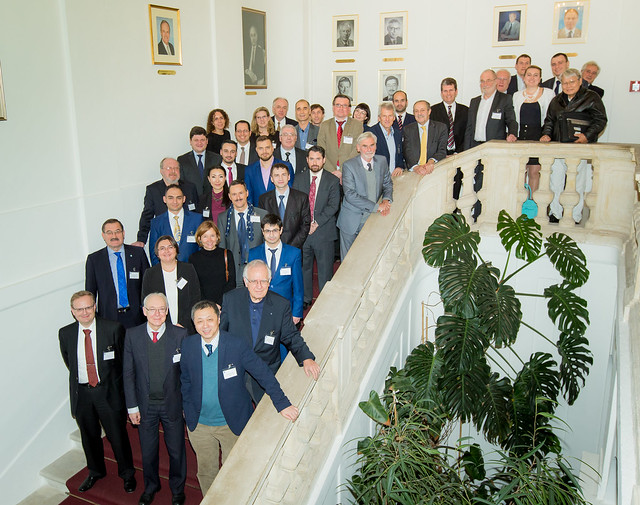22 November 2016 - 23 November 2016
IIASA, Wodak room
EU-EAEU in Greater Eurasia: Long-Term Agenda for Economic Cooperation
Through the six workshops which already took place in the framework of the project, the participants - more than 200 recognized scientists, experts, stakeholders and policy-makers from numerous countries and organizations, including the representatives of the European Commission and the Eurasian Economic Commission, - addressed such key themes as methodologies for modeling of trade-related issues, as well as, trade policies and their possible impacts, non-tariff barriers to trade and technical regulations, energy (oil and gas, electric power), transport infrastructure, as well as labor markets and migration. This workshop drew substantive, as well as methodological conclusions and discuss possible extensions.
Overall, this IIASA activity intended to provide the scientific underpinnings for potential policy ideas and solutions for the development of a future sustainable economic cooperation between the European Union, the Eurasian Economic Union, and their neighbors – Eastern Partnership, Central Asian, and other countries of the region. We aimed to prepare scientifically well-grounded analyses, options and policy recommendations for potential cooperation to be ready by the time when the political situation will settle down and the conditions to turn these hypothetical scenarios into real ones will be in place.
Research Project ‘Challenges and Opportunities of Economic Integration within a wider European and Eurasian Space’
Phase I has enabled assembling useful information and revealed important lessons. IIASA and its partner institutions take a long view regarding the EU-EAEU cooperation. In the current politically unfavorable circumstances, we have succeeded to bring together officials and experts from the EU, EAEU and neighboring countries in a constructive dialogue, seeking to prepare a mutually agreed ground for future initiatives, which, as soon as the political context improves sufficiently, will support transition to the implementation of the Lisbon-to-Vladivostok concept. This would be based on the science-based evidence concerning the rebuilding the damaged economic relations between the EU and Russia. Due to the sheer scope of related issues, the discussion on an anticipated agreement, or set of agreements, could be referred to as a “mega deal”.
As the importance of various aspects is likely to be different for the two sides, the mutual concessions and compromises would be necessarily interconnected. In particular, due to its current prevailing export structure, the EAEU might be interested not merely in a free trade agreement per se, but in a comprehensive agreement with the EU, going beyond a pure FTA. It is probable that such a deep cooperation cannot be established in one step, rather it would be built gradually, in several stages.
The deliberations of the initial screening discussions and preliminary policy ideas stemming from the series of IIASA workshops held during 2014–2016 covers the following domains:
- Methodology of assessing the economic impact of an EU EAEU integration agreement on its parties: We stress that it should necessarily go beyond estimating short-term direct trade effects extending to long-term and indirect effects, especially those related to the non-tariff barriers; proper estimation of the impacts of these will require a combination of contemporary analytical and modeling method
- Trade regimes: We provide a list of 20 potential domains of the EU EAEU ‘mega deal’ – from trade in goods to intellectual property; and make an argument, that in order to become mutually beneficial for all sides, this deal should go beyond a pure, traditional free trade area.
- Non-tariff barriers: We emphasize that the economic impacts of NTBs (technical standards, health and veterinary regulations, customs administration, etc.) can be very substantial, far exceeding the impacts of eliminating the remaining import tariffs.
- Energy: We suggest that there is a fundamental reciprocal interest in energy security for the EU and Russia. For the EU, this is supply security (source security, transit security, and fair and predictable prices); for Russia and Kazakhstan, this is demand security (financial and economic security, and fair and predictable prices; for transit countries – stability of revenues and supplies; for all, it is about environmental security and systemic resilience.
- Transport and infrastructure: We focus on the need to modernize and further develop the major Eurasian transport corridors (both road and railway) until 2030. As concerns infrastructure, we also stress the huge potentials of the development of common electric power markets, pipeline systems and trans-continental fiber-optic links. Adequate regulatory frameworks, security, and investments are key in both domains.
- Mobility of people: We argue for the facilitation of issuing visas and residence permits in order to ensure the mobility of businessmen, experts and professionals, the mutual recognition of qualifications. These steps can eventually lead to visa-free regime, large-scale academic exchanges, and the technical decision for the mobility of trans-border pensions. At the same time, we argue against prematurely raising the issue of the labour migration in the EU EAEU context.
Another topic concerns the future of trade and economic relations between the EU, the EAEU and Ukraine, Moldova and Georgia, the three states that have already concluded AA/DCFTAs with the EU. The development of EU EAEU relations will require the opening of constructive negotiations on a fair trade policy between the three DCFTA signatory states and the EAEU, with the participation of the EU to ensure the compatibility of the EU EAEU cooperation deals with the respective DCFTAs.
Photo Gallery

Workshop materials
PUBLICATIONS



